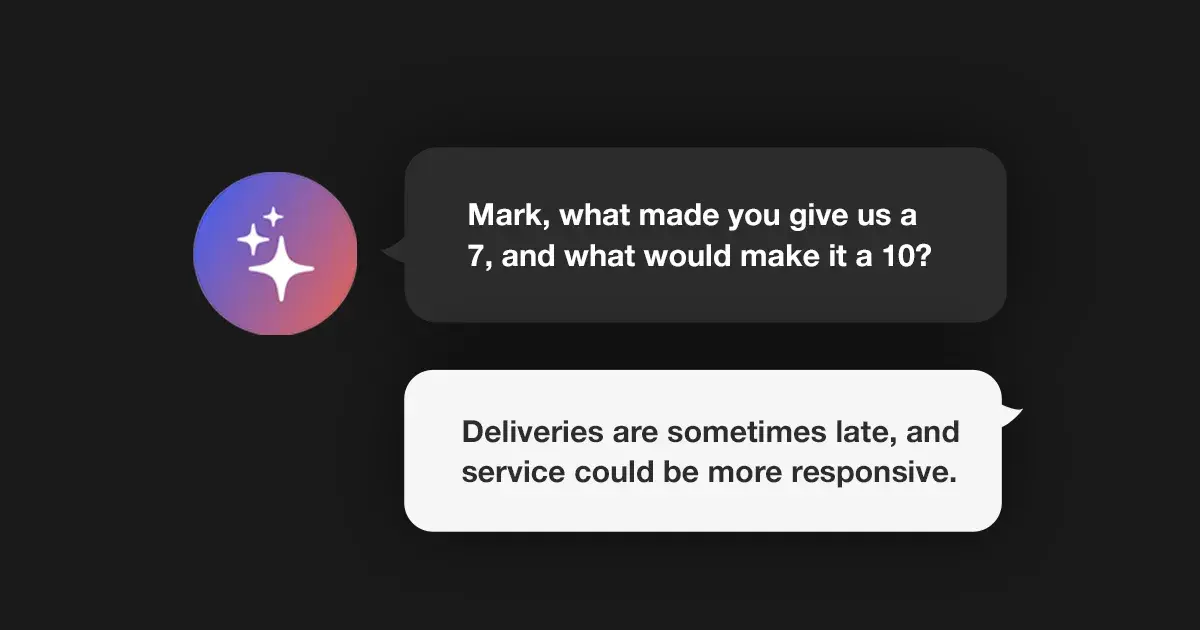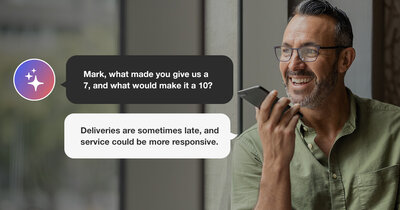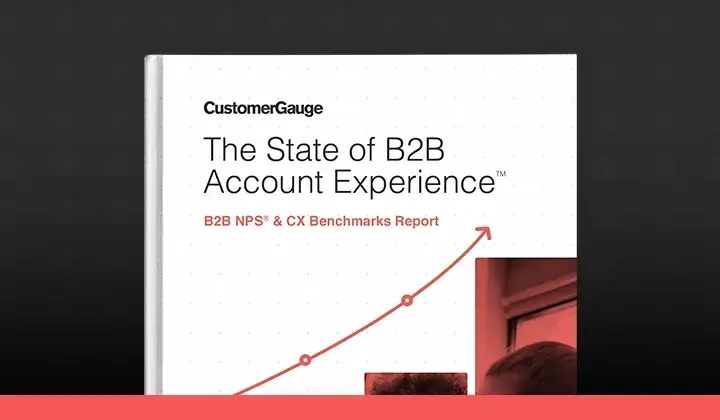In our latest episode of the Account Experience Podcast, we welcome the inventor of the Net Promoter System, Fred Reichheld. The CEO and Co-Founder of CustomerGauge talks with Fred about the origins of Net Promoter®, Fred’s new book “Winning on Purpose,” and the future for B2B Account Experience. And yes, even Fred’s biggest regrets when it comes to Net Promoter Score.
How The Name “Net Promoter” Came About
“Believe it or not, we had a different name for Net Promoter. These loyalty leaders, Net Promoter leaders have a moral compass and set of ethics that are formulated around the golden rule.”
When Fred was thinking about the name, he tried to boil down exactly what the essence of this new indicator was and he came to this conclusion:
“When a company or team touches a customer, have they enriched the life or diminished the life of a customer?”
And here’s the bombshell:
“I was originally going to call it new lives enriched, and I wish I had! There are a lot of businesses where enriching lives really resonate with their employees, much better than promoters or detractors. I thought ‘net lives enriched’ was too soft and lovey dovey.”
“I remember sitting in a cab and pondering these different names like ‘net advocacy score’, ‘net fan score’ and ‘Net Promoter’ was sort of winning in my head but then I had this image of that fight promoter that used to work for Muhamed Ali and his hair was crazy, and I thought ‘promoter’ is just not a good name, but I settled.”
That’s right folks, you heard it here first, Fred wished he kept his original name of Net Lives Enriched, but by the time Net Promoter was released in the wild, it spread too far and wide to change it. A mistake? Probably not as Net Promoter has been widely adopted, but definitely an interesting regret from the creator of Net Promoter!
Fred on Net Promoter Score in the Digital Age
On digitalization, Adam asked Fred how he thinks Net Promoter fares in the current world, and Fred, god love him, pulls no punches:
“Digitalization is awesome. There are people that say Net Promoter is less relevant in the digital age and I think to myself ‘my god these are the stupidest people I’ve ever met’ digitalization is this awesome opportunity to measure effectively and delight customers...in the re-conceiving of the customer journey there are so many opportunities to shock and amaze customers with some many wonderful, thoughtful kind and caring innovations—this is the age of net promoter and the evidence is clear.”
And Fred’s not wrong, over ⅔ of Fortune 100 use Net Promoter.
“I thought naming it was the most important thing, it was not. The most important choice was going with an open source mentality where practitioners could use it, experiment with it, change it, modify it and the innovation and insights just exploded.”
But making it open source has downsides and Fred mentions ‘you lose control of it.’ But his core philosophy is to treat people the way you want to be treated.
Fred believes “most people are using and abusing the system. They’re making this cancerous decision to link it to compensation and the front line. But within a year or two it essentially destroys itself and you get begging and pleading for high scores.”
And this echoes our experience in B2B as well, if you link to compensation people start begging and using ‘car salesperson’ tactics to inflate scores and the program inevitably will collapse.
Winning on Purpose
Fred’s new book is called “Winning on Purpose” and Adam wanted to know a bit about how Fred came up with the name. Here’s the story:
Fred had time to think and reflect on the current state of business and he kept asking himself ‘why do people not see the golden rule as the key to success?’
Looking back to the Net Promoter days it was bluntly obvious to Fred and his team that If you looked back at the highest Net Promoter Score companies, their scores were directly correlated with a leadership team that truly believed the reason their business existed was to make their customers' lives better. But Fred mentioned that he came to realize this was a minority point of view.
The realization Fred had after this exercise was that only 10% of businesses today believe their purpose is to serve their customers. And he presents powerful evidence that serving your customers better is the only way to win today.
The Rise of Customer Capitalism
In Fred’s book, he talks about how accounting was developed for capital-intensive industries like railroads, steel manufacturers and has evolved very little since then.
Fred even talks about Bain’s balance sheet as being a complete waste of time. “Of course you have to do it,” says Fred “but in a complete service business, it makes no sense at all.”
So he asks the question—” why are we making these businesses go through all of these antiquated accounting practices and not measuring what really matters. Who are your assets, maybe your employees that delight customers, maybe your customers themselves.”
Fred is advocating for customer-based accounting. One way companies can track customer growth is by tracking referrals and focusing on earned growth—essentially how much is earned through referrals and how much is bought through advertising and expensive marketing campaigns.
But does it pay to invest in such customer practices?
Short answer—absolutely.
Fred claims with Bain’s detailed analysis of industry vs. industry Net Promoter Scores, he has a very clear picture of which companies value and feed customer loyalty. Whenever there is no client conflict, he invests in those high-performing NPS companies and has been for ten years.
So how did he fare?
Fred claims his returns are more than triple the stock market over the decade.
He also states that there are very few PE firms that can match that record and no public ETFs or mutual funds that can claim the same returns.
So Fred went a step further and created an index called FREDSI
It stands for Foster Recommendation and Eliminate Detraction Stock Index. This stock index and the customer-first companies included is the secret to more than tripling the stock market over the last ten years.
The Golden Rule & NPS (& B2B of Course!)
But what is this all really about? What does the act of referring a friend or colleague to a product or service really mean?
Fred believes it’s about love—they want to enrich the lives of their friends and family.
Fred believes Net Promoter is really a Net Love Score. It’s the notion of what makes people loyal. He believes you don’t trick them with fine print, you treat them well and set them up for the best outcome possible.
In short, great businesses love their customers..it’s really that simple.
But, what about B2B? Does loving your customers still work?
Most people think Net Promoter is a consumer invention, but that couldn’t be further from the truth according to Fred. “It started in a business to business context. The idea came from large complex B2B enterprises.”
Adam mentioned that CustomerGauge is happily helping B2B companies across the globe continue Fred’s B2B NPS legacy with Account Experience, a B2B experience methodology that embodies consumer capitalism and customer love in a software package.
To close out, Fred gave one final example of this business ethos in action. There was an article in the Wall Street Journal recently where a restaurant put a sign in the window that said “Be kind or please leave.” Fred wishes the leaders of today embodied that mentality more.
The golden rule is quite possibly the most powerful concept in human history, isn’t it about time companies follow the lead of people?
And that is how you win your customer's hearts and lifelong loyalty (on purpose).




